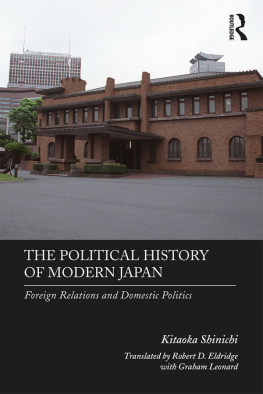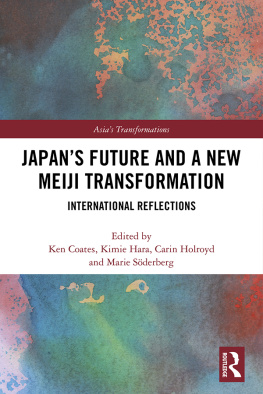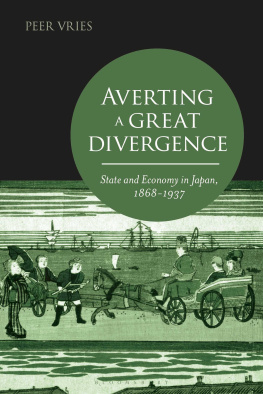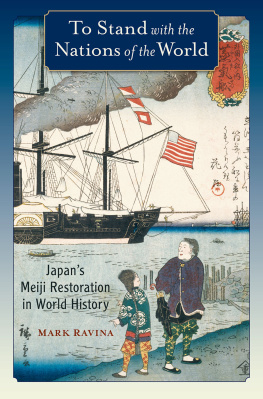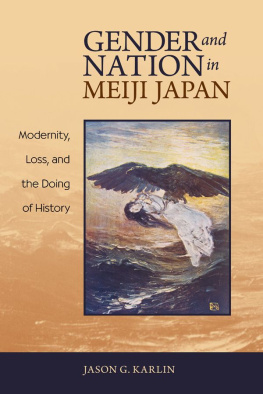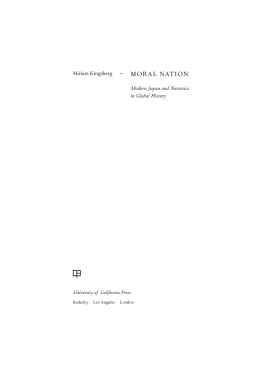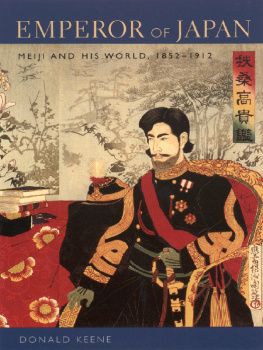Meiji Japan in Global History
This book examines Meiji Japan (18681912) to demonstrate the complex interplay between Japanese nation-building and the countrys engagement with global processes. Meiji Japan refers to an era (18681912) thatas experienced from withinhad an undetermined duration and extent. The length of the emperors reign was not preordained, and the countrys territorial borders were not as well-defined or wide-reaching at the start of the period as at the close. Questions about who was represented by and who identified with the emerging nation-state remained in flux as Japans modern political, economic, legal, and sociocultural parameters were being created.
Basing their inquiries on the idea of Meiji Japan in global history, the authors examine Japans rise on the modern world stage, focusing on the individualswhether government leaders, intellectual elites, indigenous communities, or colonial migrantswho both shaped and were shaped by this era of global connectivity. Localized challenges and supranational opportunities meant people were in motion, as territorial expansion redefined marginalized groups, and as diverse populations moved to and from colonized and foreign lands. This volume seeks to excavate how people back then positioned themselves in a specific time and place, just as people in the twenty-first century seek to give Meiji Japan meaning at the sesquicentennial commemoration of its start.
The chapters in this book were originally published in the journal Japan Forum.
Catherine L. Phipps is Associate Professor of History and Director of International and Global Studies at the University of Memphis. She is the author of Empires on the Waterfront: Japans Ports and Power, 18581899 (Harvard University Asia Center, 2015).
First published 2022
by Routledge
2 Park Square, Milton Park, Abingdon, Oxon, OX14 4RN
and by Routledge
605 Third Avenue, New York, NY 10158
Routledge is an imprint of the Taylor & Francis Group, an informa business
2022 BAJS (British Association for Japanese Studies)
All rights reserved. No part of this book may be reprinted or reproduced or utilised in any form or by any electronic, mechanical, or other means, now known or hereafter invented, including photocopying and recording, or in any information storage or retrieval system, without permission in writing from the publishers.
Trademark notice: Product or corporate names may be trademarks or registered trademarks, and are used only for identification and explanation without intent to infringe.
British Library Cataloguing-in-Publication Data
A catalogue record for this book is available from the British Library
ISBN13: 978-0-367-69331-2 (hbk)
ISBN13: 978-0-367-69334-3 (pbk)
ISBN13: 978-1-003-14141-9 (ebk)
DOI: 10.4324/9781003141419
Typeset in Goudy Oldstyle Std
by codeMantra
Publishers Note
The publisher accepts responsibility for any inconsistencies that may have arisen during the conversion of this book from journal articles to book chapters, namely the inclusion of journal terminology.
Disclaimer
Every effort has been made to contact copyright holders for their permission to reprint material in this book. The publishers would be grateful to hear from any copyright holder who is not here acknowledged and will undertake to rectify any errors or omissions in future editions of this book.
Catherine L. Phipps
I write this updated introduction two years after the Meiji Restorations sesquicentennial year ended. That anniversary occasioned the Japan Forums special issue Meiji Japan in Global History and the subsequent articles I introduced in Global Geographies of Meiji Japan: Two Perspectives.1 All eight articles are being republished together in this volume.
The Restorations 150th anniversary offered a chance for commemorationto remember the dramatic events that unfolded during the revolutionary moment of 1868 and its long aftermath as well as to reflect on its significance from the vantage of the present. Such remembrance takes many forms, bringing into play historical memory (a highly selective, fluid, and contested process), economic opportunity (especially in todays tourist industry), political posturing (as seen in statements of the national governments agenda and heard in voices opposing it), and narratives that restore, retell, or co-opt the past for present and future purposes.
Since 2018, the emergence of the global Covid-19 pandemic has disrupted some of the ways political, economic, or academic agents used the advent of the sesquicentennial to plant purposeful mileposts along the nations historical and historiographical paths. Such markerssome of which were sketched in my two previous introductions (now combined and offered below)were placed just prior to the unforeseen pandemic.
If the virus arrived just months earlier, or the Restoration itself occurred months later, the sesquicentennials circumstances may well have precluded academic gatherings, curbed tourism, and amplified Japanese concerns for the countrys future economy, demographics, and security. As a Japanese Studies special issue on the Meiji Restoration has so clearly demonstrated, the context of the commemoration can dramatically alter the stories and politics of remembrance. The 50th, 60th, 100th, and 150th anniversaries occurred in distinct political climates as Japans domestic and international situations changed from 1918 to 1928 and 1968 to 2018.2 Accordingly, the longer history of commemoration also helps us discern how stakeholders have used these occasions to articulate their assessments of where the country and its people have been and in what direction they would like things to move forward.
As things currently stand, pronouncements in 2018 that were intended to herald a brighter future seemingly ring hollow today, at least temporarily. In just the past two years, governments around the globe have instituted strict restrictions on physical mobility, economies have slowed, and the total number of reported Covid deaths stands at nearly 2,250,000 worldwide.3 In Japan, Prime Minister Shinz Abe stepped down on September 16, 2020, due to poor health and amidst criticism for his lackluster response to the pandemic and the enormously costly postponement of the yet-to-be held 2020 Tokyo Olympics. This highly anticipated event was expected to mirror the 1964 Tokyo games in showcasing the nations resilience and launching its revival on the world stage, not unlike the sesquicentennial. Whether these international games will be held in 2021 remains an open question.
The swift spread of this highly contagious, deadly virus has highlighted the importance of understanding our global interdependence. Todays accelerated global connections provided the means for Covids rapid diffusion to nearly every country, prompting the closing of national borders, slowing the physical movement of people, and recentering a reliance on the nation-state. This retraction has happened at a time when many developed countries, including Japan, were already experiencing a rising nationalist backlash against global integration, especially around immigration and identity politics. Moreover, the coronavirus has hit countries and the communities within them quite disparately, emphasizing national (and local) strengths and vulnerabilities regarding government response, workforce, medical infrastructure, social welfare, digital access, and the like. Nonetheless, international cooperation and coordination represent our best hope for ending the pandemic. Supranational organizations and multinational corporations have the potential to mitigate the global impact of Covid-19 through, for example, information sharing in disease prevention and treatment, vaccine development and distribution, and humanitarian aid.


